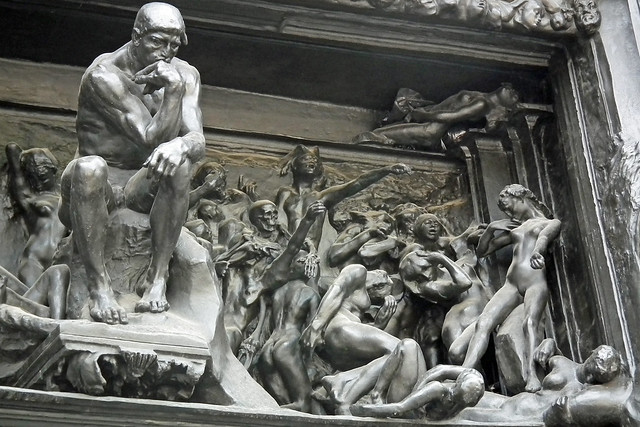I guess you could say I visited the gates of
hell and lived to tell about it. When I was in Philadelphia last year I made a visit to the Rodin Museum where I saw La Porte de l'Enfer
(The Gates of Hell). Thankfully, the number of mortals that
will actually visit the literal gates of hell* are extremely few. In
fact, the club is so exclusive, that we will probably live out our lives and
never meet a member of it. But while reading D&C 76,
I was impressed with the details describing the fate of those souls banished to
eternal hell:
32 They are they who are
the sons of perdition, of whom I say that it had been better
for them never to have been born;
33 For they are vessels of wrath, doomed
to suffer the wrath of God, with the devil and his angels in eternity;
34 Concerning whom I have said there
is no forgiveness in this world nor in the world to come—
35 Having denied the Holy Spirit
after having received it, and having denied the Only Begotten Son of the
Father, having crucified him unto themselves and put him to an
open shame.
36 These are they who shall go away into
the lake of fire and brimstone, with the devil and his angels—
37 And the only ones on whom
the second death shall have any power; (D&C
76:32-37; emphasis mine)
For the Lord to say it is better
that they had never been born is saying something. Birth and mortality are part
of his great plan to bless his children and crown them with glory (see the rest
of section 76 for this). Therefore suffering the wrath of God
for eternity is very much out of keeping with his nature. But
agency is such a central part of God's plan that he is bound
to honor it. For the sons of perdition, their recalcitrant refusal to be
saved—even in the face of irrefutable evidence of God's power and grace to
redeem them—is respected.
CS Lewis is my favorite Christan apologist. He
had quite a lot to say on the subject (here
for a good summary).
“I willingly believe that the damned are, in
one sense, successful, rebels to the end; that the doors of hell are locked on
the inside.” – The Problem of Pain
"A man can't be taken to
hell, or sent to hell: you can only get thee on your own
stream." – The Dark Tower
“There are only two kinds of people in the end:
those who say to God, ‘Thy will be done,’ and those to whom God says, in the
end, ‘Thy will be done.’ All that are in Hell, choose it. Without that
self-choice there could be no Hell. No soul that seriously and constantly
desires joy will ever miss it. Those who seek find. To those who knock it is
opened.” – The Great Divorce
“A damned soul is nearly nothing: it is shrunk,
shut up in itself. Good beats upon the damned incessantly as sound waves beat
on the ears of the deaf, but they cannot receive it. Their fists are clenched,
their teeth are clenched, their eyes fast shut. First they will not, in the end
they cannot, open their hands for gifts, or their mouths for food, or their
eyes to see.” – The Great Divorce
If the sons of perdition are the only ones that
will not be redeemed in the due time of the Lord, it follows that
everyone else will be. All but the sons of
perdition will eventually receive forgiveness. Hopefully we apply
the atonement and realize that forgiveness it in this world rather than in the
world to come. But either way, the Lord intends to redeem the works of his
creation (D&C 76:43).
For all the rest shall be brought forth by the
resurrection of the dead, through the triumph and the glory of the Lamb, who
was slain, who was in the bosom of the Father before the worlds were made.
D&C 76:39
There is a difference between inheriting the
kingdom of heaven and inheriting glory. Though exaltation in the
celestial kingdom is a lofty goal (see Matthew 7:13-14; D&C 76:109),
it is well within our reach (see Alma 7:14).
For those that fail to seize it, the consolation prize is not too shabby:
The Lord thy God in the midst of thee is mighty;
he will save, he will rejoice over thee with joy; he will rest in his love, he
will joy over thee with singing. Zephaniah 3:17





